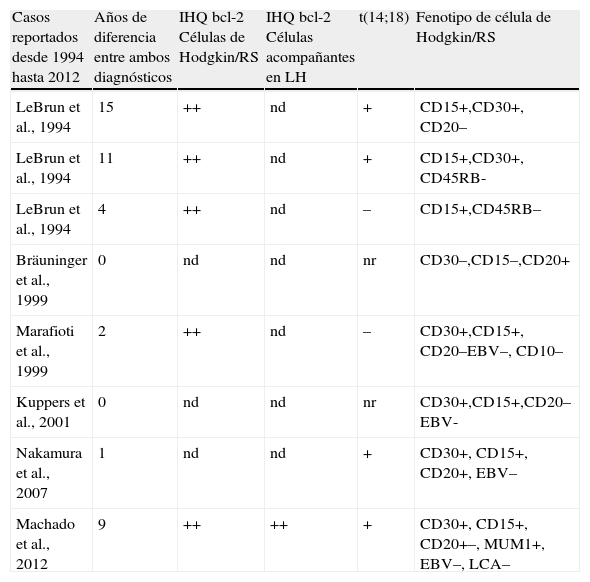Se describe un caso inusual con diagnóstico de linfoma folicular (LF) que subsecuentemente desarrolló un linfoma de Hodgkin (LH). Las células neoplásicas en el LF mostraron positividad para CD20, bcl2 y bcl6, y fueron negativas para CD10, MUM-1, CD5, CD43, CD30, CD15 y EBV. Las células de Hodgkin y de Reed-Sternberg en el LH fueron positivas para CD30, CD15, MUM1, bcl2 y focalmente para CD20, pero negativas para CD45, CD3, CD4, CD5 y EBV. El estudio por biología molecular detectó la t(14;18) en ambos linfomas (LF y LH) y el producto de la PCR mostró características similares en ambas muestras. El presente estudio sugiere, como se ha reportado previamente, la probabilidad de un origen clonal común de ambos linfomas cuando ocurren en un mismo paciente. Adicionalmente, estos resultados confirman que los pacientes con linfoma no Hodgkin pueden desarrollar subsecuentemente un LH enfatizando en la necesidad de rebiopsiar los pacientes con linfoma no Hodgkin que muestren una aparente recaída clínica.
An unusual case of follicular lymphoma (FL) with subsequent development of Hodgkin's lymphoma (HL) is described. The lymphoma cells of the FL were positive for CD20, bcl-2 and bcl-6, and negative for CD10, MUM-1, CD5, CD43, CD30, CD15 and EBV. The Hodgkin and Reed-Sternberg cells of HL were positive for CD30, CD15, MUM1, bcl-2 and focally positive for CD20 but negative for CD45, CD3, CD4, CD5 and EBV. The t(14;18) translocation was detected in both lymphoma samples and the PCR products of similar characteristics were found in both FL and HL samples. The results of present study suggest a probable common clonal origin of FL and HL occurring in the same patient, as has been previously reported. Furthermore, these results confirm that patients with non-Hodgkin lymphoma can subsequently develop HL and emphasizes the need to perform a new biopsy in non-Hodgkin lymphoma patients with an apparent clinical relapse.
Artículo
Comprando el artículo el PDF del mismo podrá ser descargado
Precio 19,34 €
Comprar ahora










